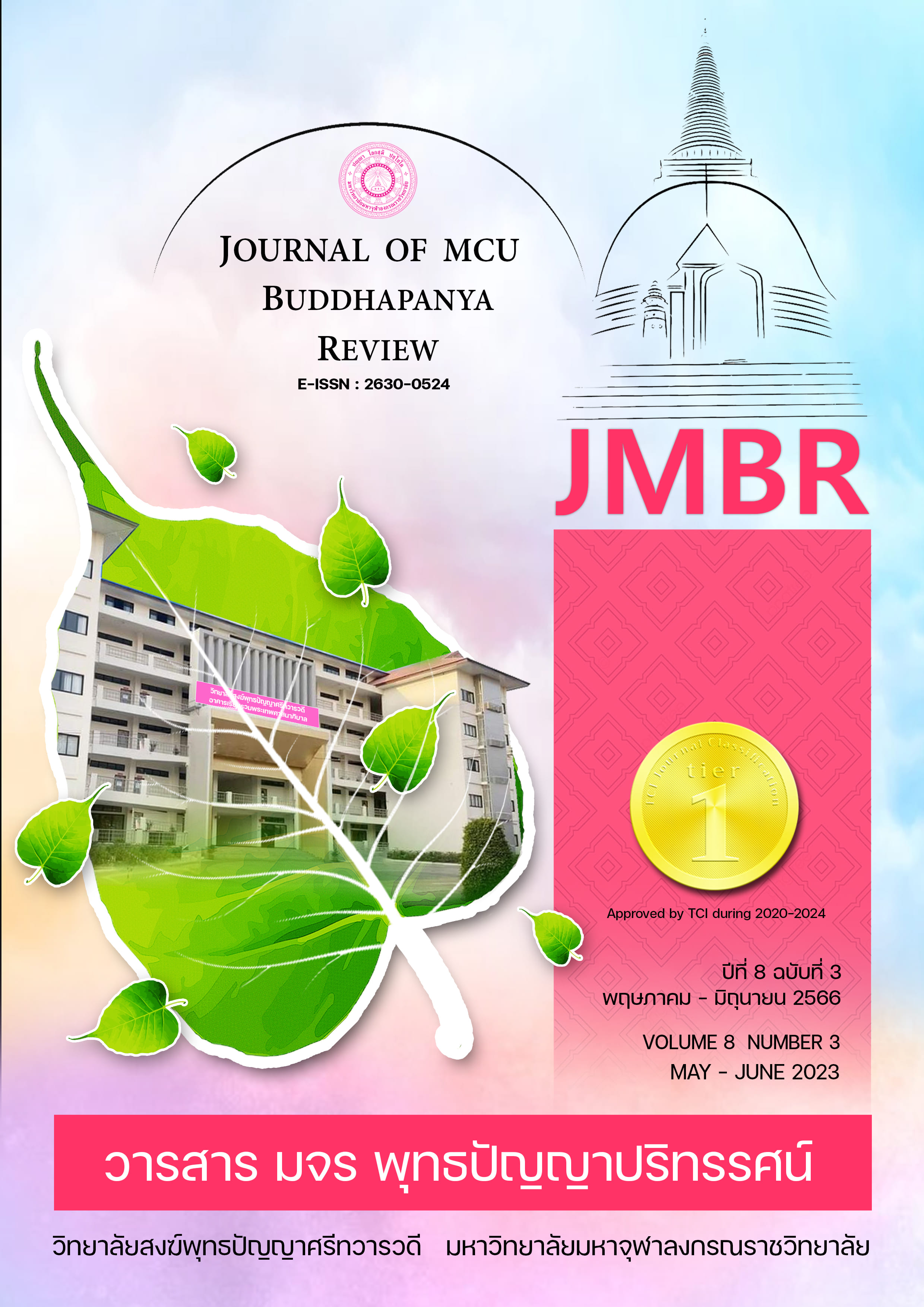การพัฒนาผลสัมฤทธิ์ทางการเรียน เรื่อง ระดับภาษาและคำราชาศัพท์ของนักเรียนชั้นมัธยมศึกษาปีที่ 4 โดยการจัดการเรียนรู้ตามแนวคิดห้องเรียนกลับด้าน
คำสำคัญ:
ระดับภาษา, คำราชาศัพท์, ห้องเรียนกลับด้านบทคัดย่อ
การวิจัยครั้งนี้มีวัตถุประสงค์เพื่อ 1) เปรียบเทียบผลสัมฤทธิ์ทางการเรียน เรื่อง ระดับภาษาและคำราชาศัพท์ของนักเรียนระดับชั้นมัธยมศึกษาปีที่ 4 ก่อนและหลังการจัดการเรียนรู้ตามแนวคิดห้องเรียนกลับด้าน 2) ศึกษาความคิดเห็นของนักเรียนชั้นมัธยมศึกษาปีที่ 4 ที่มีต่อการจัดการเรียนรู้ตามแนวคิดห้องเรียนกลับด้าน ตัวอย่างที่ใช้ในการวิจัย คือ นักเรียนชั้นมัธยมศึกษาปีที่ 4/1 โรงเรียนบางลี่วิทยา อำเภอสองพี่น้อง จังหวัดสุพรรณบุรี ภาคเรียนที่ 2 ปีการศึกษา 2564 จำนวน 1 ห้องเรียน 44 คน ได้มาจากการสุ่มอย่างง่าย (Simple Random Sampling) โดยใช้ห้องเรียนเป็นหน่วยสุ่มด้วยวิธีจับสลาก เป็นการวิจัยเชิงทดลอง แบบกลุ่มเดียวทดสอบก่อนและหลังเรียน เครื่องมือที่ใช้ในการวิจัย ได้แก่ แผนการจัดการเรียนรู้ เรื่อง ระดับภาษาและคำราชาศัพท์ตามแนวคิดห้องเรียนกลับด้าน แบบทดสอบวัดผลสัมฤทธิ์ทางการเรียน และ การวิเคราะห์ข้อมูลใช้ค่าเฉลี่ย (M) ค่าเบี่ยงเบนมาตรฐาน (SD) และการทดสอบค่าทีแบบไม่เป็นอิสระต่อกัน
ผลการวิจัย พบว่า 1. ผลสัมฤทธิ์ทางการเรียน เรื่อง ระดับภาษาและคำราชาศัพท์ของนักเรียนชั้นมัธยมศึกษาปีที่ 4 ที่จัดการเรียนรู้ตามแนวคิดห้องเรียนกลับด้าน หลังการจัดการเรียนรู้สูงกว่าก่อนการจัดการเรียนรู้อย่างมีนัยสำคัญทางสถิติที่ระดับ .05 2. นักเรียนมีความคิดเห็นต่อการจัดการเรียนรู้ตามแนวคิดห้องเรียนกลับด้าน ในภาพรวมอยู่ในระดับเห็นด้วยมาก
เอกสารอ้างอิง
Changkwanyuen, W. and faculty. (2009). “Language levels” in Use of language, 10-11 2th ed. Nakorn Pathom : Textbook and Book Project Faculty of Arts Silpakorn University.
Bangpoophamorn, K. (2016). The Development of Flipped Classroom Model with Self-Directed Learning to Enhance Critical Thinking in an Undergraduate Course. Thesis, Doctor of Philosophy in Technical Education Technology Faculty of Technological Education King Mongkut’s University of Technology North Bangkok.
Bergmann, J.,&Sams, A. (2012) . Flip your classroom: reach every student in every classevery day : International Society for Technology in Education.
Boonyarit, B. (1993). Royal Words. Bangkok: Suweeriyasarn.
Boonyot, W. (2018). The Development of Online Learning Using Flipped Classroom to Enhance Learning Achievement on Presentation Using Computer Software. Thesis, Master of Science in Computer Education Department of Industrial Education and Technology King Mongkut’s Institute of Technology Ladkrabang.
Dixon-Krauss, L. (1997). Vygotsky in The Classroom : Mediated Literacy Instruction and Assessment. U.K : Pearson.
Jamaludin, R., and Osman, S. Z. M. 2014. The Use of a Flipped Classroom to Enhance Engagement and Promote Active Learning. Journal of Education and Practice, 5 (2), 124 - 131.
Jeerangsuwan, N., and Chaiyajit A., (2015). Flipped Classroom : Study at Home – Do Homework At School?. Journal of Technical Education Development. 27(94), 21-26.
Kert-on, P. and faculty. (2017). Principles of language and usage Thai language for Mattayayom Suksa 4. (7th ed.) Bangkok: Aksorn Charoenthat.
Marlowe, C.A.. (2012). The Effect of the flipped classroom on student achievement and stress. A professional paper M.S. Bozeman: Montana State University.
Ministry of Education. (2008). The Basic Education Core Curriculum B.E. 2551 (A.D. 2008). Bangkok: Agricultural Cooperative Association of Thailand.
Nilapham, M. (2015). Educational Research Methods. Nakhon Pathom: Silpakorn University.
Pahe, S. (2013). Documents for training seminars for teachers and educational personnel under the Office of Phrae Primary Education Service Areas District Office 1-2 Teacher development course by creating a mentoring system, Nakhon Phrae Tower Hotel, Mueang Phrae District, Phrae Province.
Ruengsri, P. (2017). The Development of Flipped Classroom Activities via Online Media The influence of Self - Directed for High School Students in Occupation and Technology Subject. Thesis, Master of Education Department of Educational Technology Department of Curriculum and Instruction Silpakorn University.
Sitthiphom, P. (2018). The Effects of Flipped Classroom Activities Management on Learning Achievement in Principles of Thai Language Usage and Avidity for Learning of Mattayayom Suksa 1 Students in Schools under Secondary Education Service Area Office 18. Thesis, Master of Education in Curriculum and Supervision Sukhothai Thammathirat University.
Master of Education (Curriculum and Instruction); Sa-nguansap, W. (2016). The Development of Comprehensive Reading Abilities of Mattayom 3 Students Using Flipped Classroom Learning Management. Thesis, Master of Education Department of teaching Thai language Department of Curriculum and Instruction Silpakorn University.
Thonglor, K. (2011). Principle of Thai language. (53th ed.) Bangkok: Ruamsarn.
Thonpho, K. (2018). Thai for communication. Bangkok: O.S. Printing House.
Yenbut, P. and faculty. (2012). Thai learning books 6 for Mattayayom Suksa 6 volumes 1. Bangkok: [Aimphan Press Co.,LTD..
ดาวน์โหลด
เผยแพร่แล้ว
รูปแบบการอ้างอิง
ฉบับ
ประเภทบทความ
สัญญาอนุญาต
ลิขสิทธิ์ (c) 2023 วารสาร มจร พุทธปัญญาปริทรรศน์

อนุญาตภายใต้เงื่อนไข Creative Commons Attribution-NonCommercial-NoDerivatives 4.0 International License.



